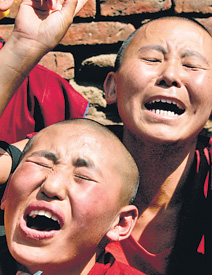
Protesting monks: A clash with rules of VinayaIn the background of violent confrontations between Buddhist monks (Bhikkhus) and the Government of Myanmar, and more recently in Tibet around the capital Lhasa, where Tibetan Lamas have clashed with the Chinese authorities, this writer has been asked many times whether the behaviour of these devout servants of the Buddha, had transgressed their Vinaya (disciplinary) rules of conduct. As a Samanera (novice) Bhikkhu, when one shaves one’s head of hair, dons a saffron robe, and takes possession of an alms bowl, and later when at the age of 20, receives higher ordination (Upasampada) after learning the ancient Pali scriptures, one is required to consciously repeat three times, before one’s Preceptor and other senior members of the Maha Sangha the words (in Pali language): "Sabbe Dukka Nissarana Nibbana Sachchi Karanathaya"- (In compassion for me, Lord let me be ordained as a Bhikkhu to enable me to achieve destruction of all suffering, and finally achieve the bliss of Nibbana).
By doing so, a Bhikkhu, voluntarily renounces all worldly or earthly pleasures, and is required to live away from civil society. He is required to lead a spiritually- oriented life in seclusion, either in the forest, or in an Aranya surrounded by nature's vegetation, meditating on aspects of the profound Buddha Dharma, such as Annichya, Anatta, or Dukkha. A Bhikkhu will sustain himself on dana offered by the laity, and if it is not forthcoming, then will go on pindapatha. His aspirations should be, to be serene or of collected mind, unselfish as a Bodhisattva would be, kind, and guide humanity to lead good normal lives. Grameeya Bhikkhus live in temples close to human settlements administering to the spiritual and social welfare of the community. The Vanawasi bhikkhus who reside in the jungle aranyas lead a more secluded life and are close to nature. They meditate, living in caves and tending to themselves. The last category are the Dhutanga Bhikkus who usually go out on pindapatha, wear ragged worn-out robes, and move from place to place and rest for the night in cemeteries, in the open air or in forests under large trees An ancient text says, a Bhikkhu is one: With mindfulness of the body extinguished, Getting back to the conduct of some bhikkhus of Myanmar and the Lamas of Tibet in recent times, their main concern is to lead a simple, righteous, religious life as shown to them by the teachings of the Great Master, Sakyamuni Gotama Buddha. The concept of human rights and their application appear not to have validity in several countries like China which have a strong socialist base. For the sake of political power, rulers do have their own agenda that can never be changed by a minority of spiritually minded people. Unfortunately, the situation in Tibet for the past 49 years is that the Chinese authorities that have become stronger and stronger militarily do not want a dialogue with the Dalai Lama, the spiritual head who lives in exile. The Dalai Lama, head of all Tibetans in exile has repeatedly told the world, that he does not want his homeland to be an independent sovereign state, but an autonomous state preserving their indigenous Mahayana Buddhism and unique culture, under the watchful "god father eye" of China. He does not advocate or support violence. He looks forward to a middle way solution to the historic problems of Chinese occupation of Tibet. Tibet has no military might. The hegemony of China in East Asia is well known. Economically, she is a strong power to reckon with. In Myanmar too the Chinese political and economic influence is well known with the military junta. The University student population backed the Sangha in the street confrontations recently against the military junta. It has not benefited the Sangha who live in large monasteries. Whilst the junta has been in power for more than two decades, it has, in fact, managed to keep at bay an unbridled flood of American and Western cultural traits. In that scenario, ancient Buddhist values and culture still appear to be intact in the country. This is what the writer noticed on two visits to this large country. In that background, the Sangha should continue to lead the simple lives that they have enjoyed, and not forget their personal commitment as Buddha putras, having Nirvana as their goal. |
|
||||||
|| Front
Page | News | Editorial | Columns | Sports | Plus | Financial
Times | International | Mirror | TV
Times | Funday
Times || |
| |
Reproduction of articles permitted when used without any alterations to contents and a link to the source page.
|
© Copyright
2008 | Wijeya
Newspapers Ltd.Colombo. Sri Lanka. All Rights Reserved. |
